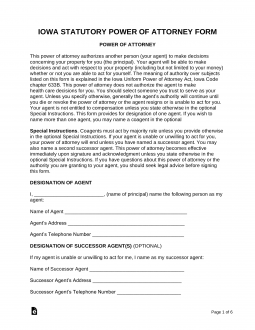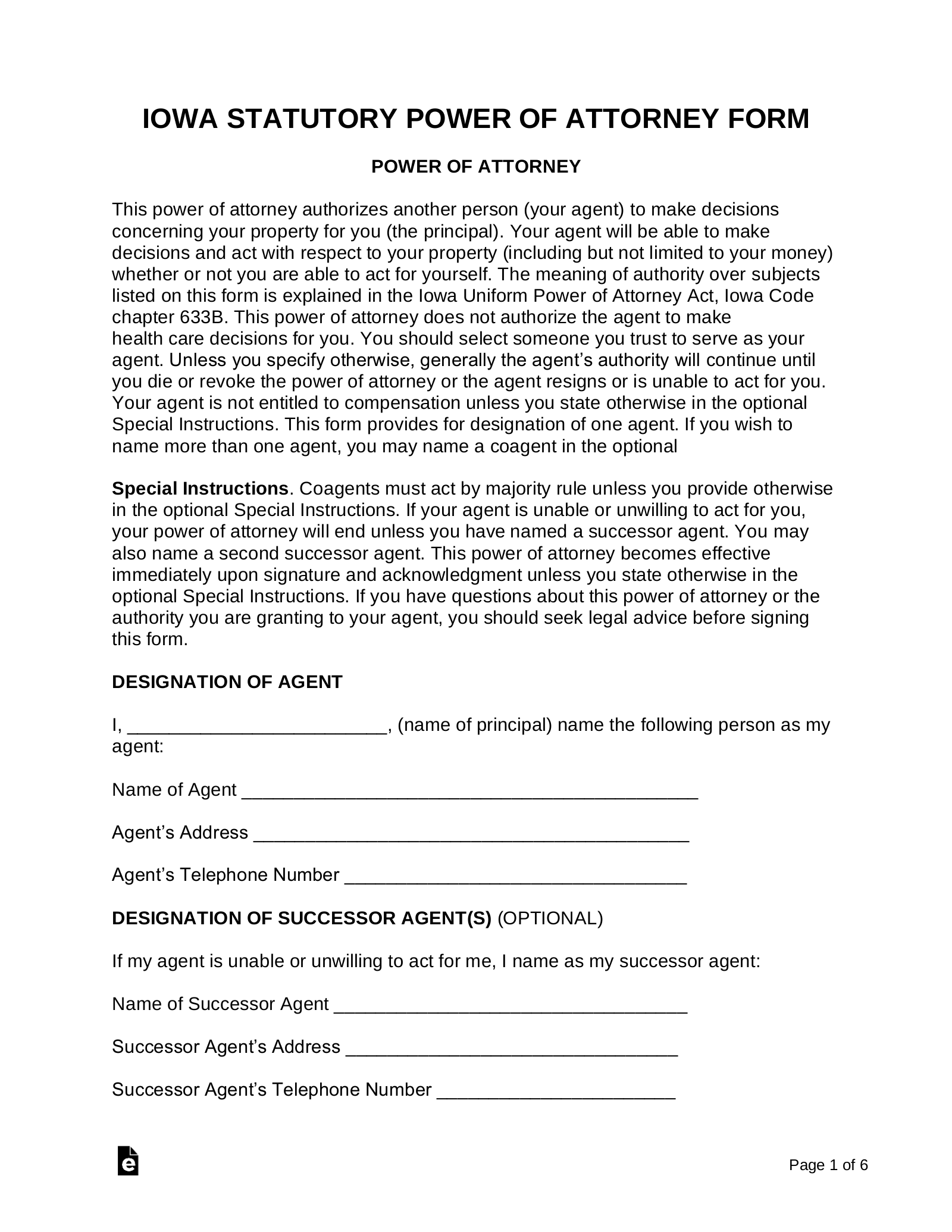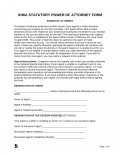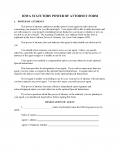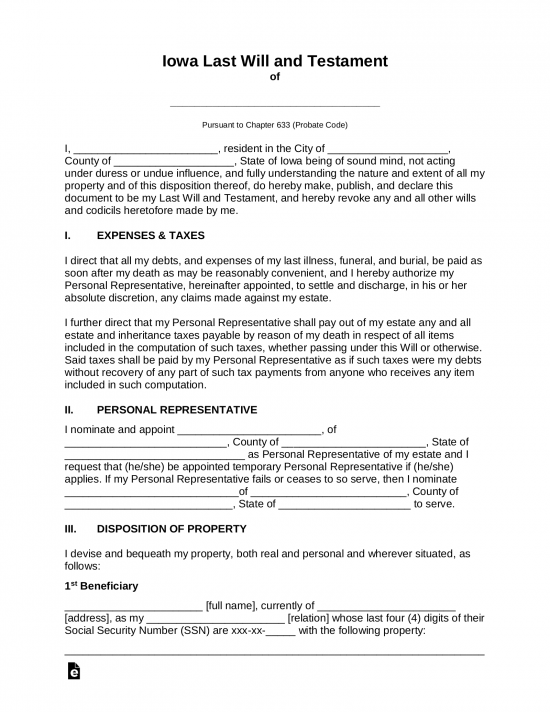Updated March 26, 2024
An Iowa durable statutory power of attorney form is used when a person wants someone to have the ability and authority to handle their financial affairs. A durable power of attorney can also be used if a person anticipates being away or incapable of handling their financial matters in the near future. Typically, spouses will be each other’s agent in a power of attorney to facilitate matters if one or the other is not available.
Table of Contents |
Versions (2)
Download: PDF, MS Word, OpenDocument
Download: PDF
Laws
Chapter 633B (Iowa Uniform Power of Attorney Act)
Definition of “Durable”
“Durable”, with respect to a power of attorney, means not terminated by the principal’s incapacity (§633B.102(3)).
Definition of “Power of Attorney”
“Power of attorney” means a writing that grants authority to an agent to act in the place of the principal, whether or not the term “power of attorney” is used (§633B.102(9)).
Signing Requirements
The principal is required to acknowledge their signature in front of a notary public. The agent only has to have their signature be notarized if they sign the optional Agent Certification (§ 633B.105, § 633B.302).
Statutory Form
The Iowa Legislature has created a sample power of attorney form available at § 633B.301.
How to Write
Download: PDF, MS Word, OpenDocument
Designation Of Agent
(1) Name Of Principal. The Iowa Party that intends to approve an Agent to wield the same authority he or she carries will be referred to in this template as the Principal. He or she will use this form to approve another person (an Agent or Attorney-in-Fac) to perform action or even make decisions in or more areas of finance. The Principal will retain the right to revoke this document at his or her discretion as needed.
(2) Name Of Agent. The Attorney-in-Fact the Principal will grant power to. The Agent (or Attorney-in-Fact) will be able to use the delegation of authority this document makes to carry out the Principal’s directives with the understanding that such use of power is approved by the Principal.
(3) Agent Contact. The Agent’s address and telephone number help to prove his or her identity and document an official means of contact to reach him or her regarding Principal decisions and actions.
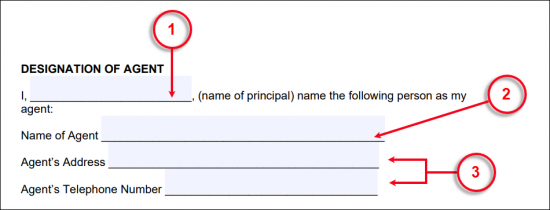
Designation Of Successor Agents
(4) Name Of Successor Agent. Regardless of how reliable the Attorney-in-Fact may be known to be, unforeseen events can prevent him or her from acting with principal power effectively. For instance, he or she may become medically incapacitated or unwilling to live up to his or her obligations as the Iowa Attorney-in-Fact for the concerned Principal. Therefore, a wise precaution would be to set up an Agent who can assume the Attorney-in-Fact role if it suddenly becomes empty. This Successor Agent can only become the Attorney-in-Fact if the original one steps down or can no longer act for the Principal.
(5) Successor Agent Contact Information.

(6) Second Successor Agent. If the Attorney-in-Fact refuses to carry out Principal directives, has had his or her powers revoked, or is unable to act in this role and the Successor Agent has been subjected to any of these conditions, also preventing him or her to take this role, then a Second Successor Agent with the ability to immediately assume principal power can be approached for this role. The full name of the Second Successor Agent must be declared for this precaution to be effective.

Grant Of General Authority
(7) Select Principal Powers. A list of subjects that can be placed in the Attorney-in-Fact’s scope of principal powers will clearly define the areas where this Party can carry out the Principal’s wishes or even make decisions in the Principal’s name. This list can be used as a menu of principal powers but will require the concerned Principal to initial each one that he or she wishes to grant to the Iowa Agent. Any power subject not initialed will be excluded from the Attorney-in-Fact’s abilities. Make note that an opportunity to discuss these powers further will be presented.
(8) Grant All Powers. Only the final list items should be initialed by the Principal to give the Attorney-in-Fact approval to act on the Principal’s behalf in all the power subjects of this list.

(9) Authorize Special Actions. Decisions and actions such as accepting/denying/making gifts in the Principal’s name, handling inter vivos trusts on behalf of the Principal, and disclaiming or refusing an interest in the property on behalf of the Principal are all examples of decisions and actions that required (additional) direct authorization from the Principal. Every statement that defines the specific action the Principal wishes the Attorney-in-Fact to have the power to perform in his or her name should be initialed by the Principal. Some items may need further information if chosen while others may be addressed later in the document.
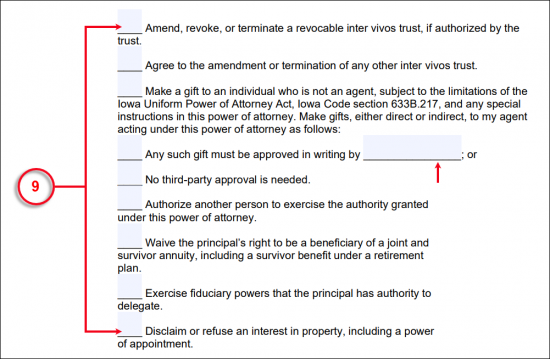
Limitation On Agent’s Authority
(10) Special Instructions. The Principal can impose limitations, conditions, or restrictions upon the Attorney-in-Fact’s use of authority by recording such provisions directly in this document as special instructions. This section also allows direct communication between the Attorney-in-Fact, any Reviewers involved, and the Principal by allowing the Principal to place directions in his or her own words.

Nomination Of conservator And Guardian
(11) Conservator Nominee. In addition to the appointment of an Attorney-in-Fact to operate with principal power in Iowa, this document allows for the nomination of a Conservator. A Court-Appointed Conservator can be assigned by an Iowa State Court when it is deemed necessary to safeguard the Principal while he or she is incapacitated. The Principal can address this issue before it happens by nominating his or her preferred Conservator. Iowa Courts often take such a nomination into serious consideration. To nominate a Court-Appointed Conservator, list his or her name, address, and phone number.
(12) Guardian Nominee. Similarly, Iowa Courts may decide that the Principal requires a Guardian of his or her person. The Principal can utilize this form to nominate a specific Party for the role of Guardian by listing the Nominee’s name, his or her address, and telephone number.
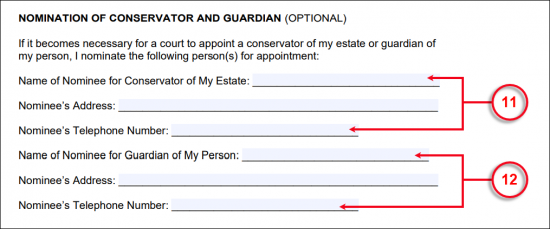
Signature And Acknowledgment
(13) Principal Signature. The Party identified as the Iowa Principal in the first section must sign his or her name in front of a Notary Public to set this appointment as effective.
(14) Iowa Signature Date. After signing this document, the Iowa Principal must immediately record the current date.
(15) Principal Name And Contact. The printed name, address, and telephone number of the Iowa Principal should accompany this Party’s signature of execution.
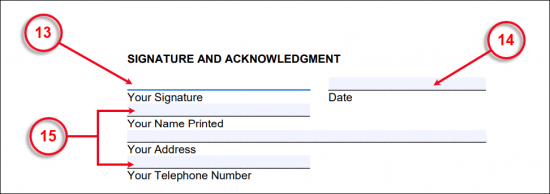
Iowa Notary Public
(16) Notary Verification. The process of notarization is required for the Principal’s signature to be considered authentic and therefore effective. The Iowa Notary Public present will instruct the Principal on the correct signature procedure for his or her office then complete the notarization section once he or she is satisfied.
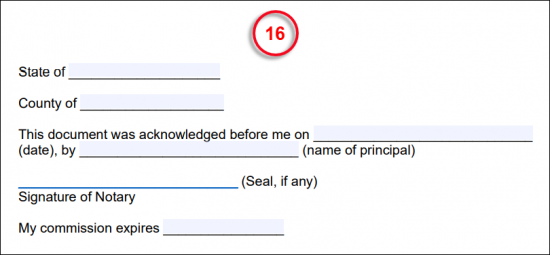
Preparer
(17) Preparer Contact. The Party who has delivered information to this paperwork either as the Principal or in service to the Principal must be listed by name, address, and contact phone number.

Agent’s Duties
(18) Principal’s Printed Name.
(19) Agent Signature. As an acknowledgment to accepting the role of the Attorney-in-Fact, the Agent must sign his or her name as a sign that he or she has the intention of wielding principal power under the Principal’s directives.
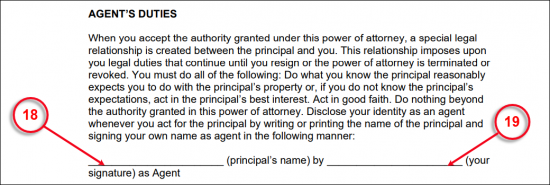
Related Forms
Download: PDF
Download: PDF, MS Word, OpenDocument

